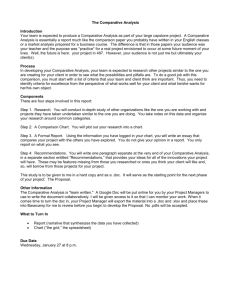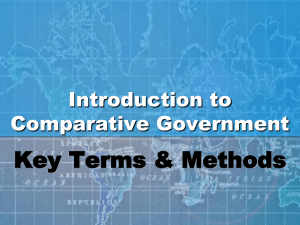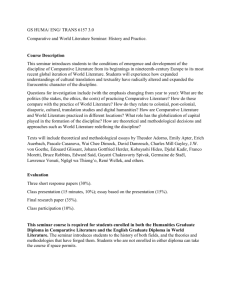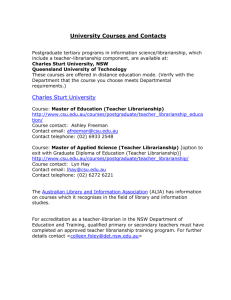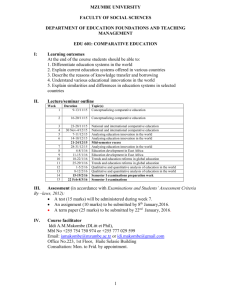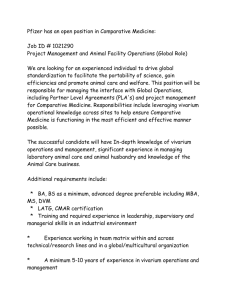Effect of Variation of Concrete Properties on the
advertisement
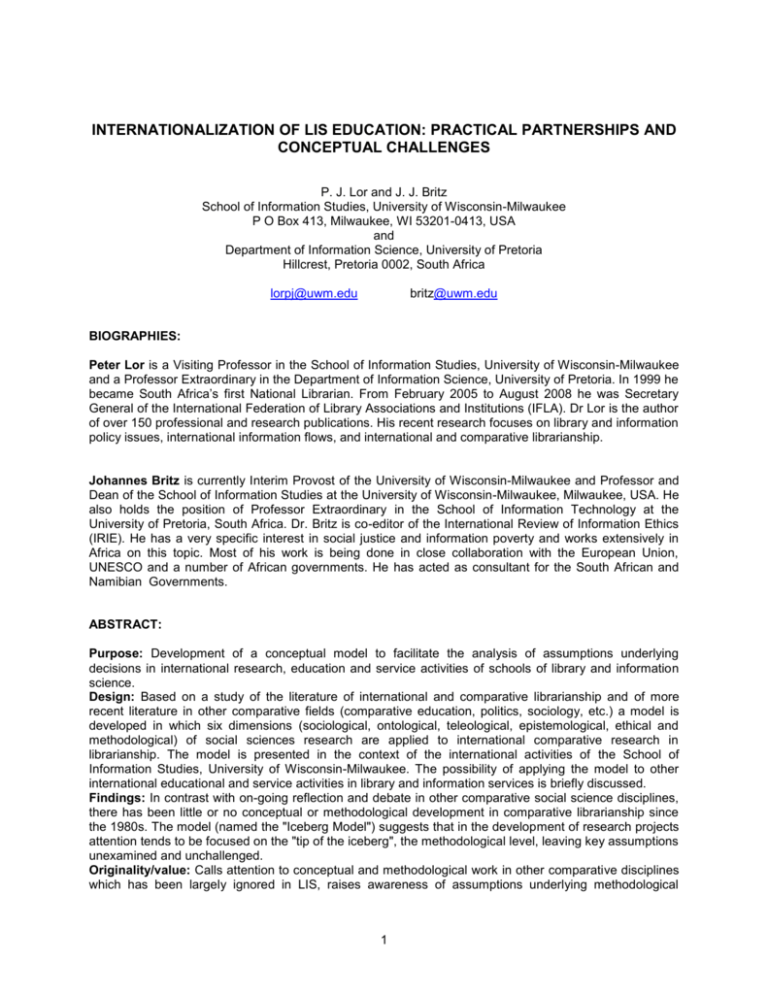
INTERNATIONALIZATION OF LIS EDUCATION: PRACTICAL PARTNERSHIPS AND CONCEPTUAL CHALLENGES P. J. Lor and J. J. Britz School of Information Studies, University of Wisconsin-Milwaukee P O Box 413, Milwaukee, WI 53201-0413, USA and Department of Information Science, University of Pretoria Hillcrest, Pretoria 0002, South Africa lorpj@uwm.edu britz@uwm.edu BIOGRAPHIES: Peter Lor is a Visiting Professor in the School of Information Studies, University of Wisconsin-Milwaukee and a Professor Extraordinary in the Department of Information Science, University of Pretoria. In 1999 he became South Africa’s first National Librarian. From February 2005 to August 2008 he was Secretary General of the International Federation of Library Associations and Institutions (IFLA). Dr Lor is the author of over 150 professional and research publications. His recent research focuses on library and information policy issues, international information flows, and international and comparative librarianship. Johannes Britz is currently Interim Provost of the University of Wisconsin-Milwaukee and Professor and Dean of the School of Information Studies at the University of Wisconsin-Milwaukee, Milwaukee, USA. He also holds the position of Professor Extraordinary in the School of Information Technology at the University of Pretoria, South Africa. Dr. Britz is co-editor of the International Review of Information Ethics (IRIE). He has a very specific interest in social justice and information poverty and works extensively in Africa on this topic. Most of his work is being done in close collaboration with the European Union, UNESCO and a number of African governments. He has acted as consultant for the South African and Namibian Governments. ABSTRACT: Purpose: Development of a conceptual model to facilitate the analysis of assumptions underlying decisions in international research, education and service activities of schools of library and information science. Design: Based on a study of the literature of international and comparative librarianship and of more recent literature in other comparative fields (comparative education, politics, sociology, etc.) a model is developed in which six dimensions (sociological, ontological, teleological, epistemological, ethical and methodological) of social sciences research are applied to international comparative research in librarianship. The model is presented in the context of the international activities of the School of Information Studies, University of Wisconsin-Milwaukee. The possibility of applying the model to other international educational and service activities in library and information services is briefly discussed. Findings: In contrast with on-going reflection and debate in other comparative social science disciplines, there has been little or no conceptual or methodological development in comparative librarianship since the 1980s. The model (named the "Iceberg Model") suggests that in the development of research projects attention tends to be focused on the "tip of the iceberg", the methodological level, leaving key assumptions unexamined and unchallenged. Originality/value: Calls attention to conceptual and methodological work in other comparative disciplines which has been largely ignored in LIS, raises awareness of assumptions underlying methodological 1 decisions, and provides a framework for analyzing them. The model offers possibilities of wider application in international activities of LIS schools. KEYWORDS: Library and Information Science Comparative Librarianship Research Methodology Conceptual Models Assumptions LIS Schools CLASSIFICATION: Conceptual paper Introduction During the past five years the School of Information Studies (SOIS) at the University of WisconsinMilwaukee has identified international work as one of its key strategic thrusts and has developed a wide range of cooperative international programs. These encompass education, study abroad, research and international development cooperation and consultancy work, with a special focus on Africa and information ethics. During this period both the faculty and postgraduate student body have become more international. Mindful of the potential pitfalls of international activities in which assumptions and beliefs remain unchallenged, the School is also developing courses in international and comparative librarianship to provide a conceptual basis for its international work. In this paper an outline of the scope of the international activities of SOIS serves as background to an attempt to develop a conceptual framework that may be useful in bringing to the surface the assumptions that are made in international comparative studies in our field. We will suggest that this framework can be of use in education and training, development cooperation and other international activities in library and information science (LIS). International activities of the School of Information Studies, University of Wisconsin-Milwaukee The School of Information Studies (SOIS) at the University of Wisconsin has positioned itself strategically towards international work as it relates to its research, teaching and service agendas. In 2010 the mission statement of the School was changed to reflect this strategic focus more accurately and an international coordinator was appointed in the School to oversee the various international initiatives. The School has furthermore adopted three interrelated ‘i’ ’s in support of its mission and goals. These are: Information = focus International = scope Interdisciplinary = mindset A key factor that contributes to the success of the international agenda of the School is the composition of its faculty. Two thirds of the 22 full time faculty members have international backgrounds. Their countries of origin are Canada, China, Egypt, Korea, South Africa, Taiwan, Uganda, Ukraine and the United Kingdom. Fourteen different languages are spoken by the staff and faculty at the school. The introduction of online teaching in 1998 made a substantial contribution to the international agenda. Both the undergraduate and the Master’s degree programs are now offered fully online as well as onsite. 2 This opens the opportunity for the international students to enroll for degree programs without having to leave their home countries. The School has a very strong international and interdisciplinary research agenda and specializes in the three interrelated areas of information policy, information organization and information retrieval. SOIS faculty are ranked in the top five LIS schools in terms of research output in the US and in 2008 the School was ranked first in terms of Library and Information Science research output in comparison to the rest of the School’s university. In the past five years the members of the School have been awarded more than $ 3 million in research and project funding. National and international funding agencies included the Institute of Museums and Library Services (IMLS), the National Research Foundation, the Canadian-based International Development Research Council, SAP Systems, the South African Government and UNESCO. In 2005 the School received a $1 million teaching grant from the IMLS to attract national as well as international students from demographic groups underrepresented in librarianship to study information organization, a specialization which is in demand. SOIS has also developed strong ties with industry, including a knowledge management project that was done for GE Health Care in 2008. The School has a strong Africa focus with activities in, amongst others, Botswana, Egypt, South Africa, Nigeria, Uganda and Kenya. SOIS worked very closely with, amongst other entities, the Department of Information Science at the University of Pretoria to organize the first ever Africa Information Ethics Conference in 2007 and a UNESCO based workshop on ethics and E-Government in Africa in 2009. A second conference on Africa Information Ethics will take place in Botswana during 2010. Dr Dick Kawooya, a senior lecturer at SOIS and originally from Uganda, is also the lead researcher on an IDRCfunded project focusing on Intellectual Property Rights and access to information in Africa. Other international activities include, but are not limited to: Dual MLIS degree program with the University of Yonsei in Korea Student and faculty exchange with the University of Hagenberg in Austria Study abroad programs to South Africa, Scotland and Korea/Japan Organizing international conferences and workshops on a variety of information sciences related topics Collaboration with the International Federation of Library Associations and Institutions and the University of Pretoria on the publication of the FAIFE World Report Series. Organizing international days on campus focusing on various research, student and faculty exchanges as well as service opportunities. Such a range of international activities presupposes a sound conceptual base. To complement a longstanding seminar offering in International and Multinational Librarianship, a new course in International and Comparative Librarianship was added in spring 2010 as an option for students at the Master’s and PhD levels. It intended to provide students who have an interest in international study, research or careers with a broad international background and to serve as a platform for theoretical and methodological reflection. In this we seek to build upon previous work in our field. The international dimension of education and research in library and information science (LIS) Although international relations among libraries can be traced much further back, international and comparative librarianship emerged as recognizable fields of study only after the Second World War. The early literature of international librarianship and comparative librarianship was dominated by apologetics (e.g. Dane, 1954a, 1954b; Shores, 1970; Asheim, 1989), emphasizing the value of these fields in terms of international cooperation and understanding, as well as by attempts to define and delimit the two fields and to distinguish between them (Collings, 1971; Danton, 1973, 1977; Harvey, 1973; Parker, 1974; Foskett, 1976). This literature petered out somewhat inconclusively, as did the attempts to establish a sound conceptual and methodological basis for the two fields, particularly for comparative librarianship (Simsova and McKee, 1970, 1975; Krzys, 1971; Danton, 1973; Krzys et al., 1982). 3 Initial inspiration for comparative librarianship had come from more established comparative disciplines, especially comparative education, but while those fields have continued to develop the conceptual and methodological basis for comparative studies (e.g. De Cruz, 1999, Dogan and Kazancigil, 1994; Hantrais, 2009; Landman, 2008; Pennings et al., 2006; Prezeworski and Teune, 1982), and sustain lively conceptual and methodological debates (e.g. Cowen, 2006; Crossley, 2002; Sartori, 1991; Schriewer, 2006), this has not happened in our field. That is not to say that no comparative studies are being undertaken, but they mostly lack any explicit methodological reflection. Since this conference is taking place in Sweden it is worth noting that some of the most interesting conceptual reflection in international comparisons in LIS has taken place in the Nordic countries, in the work of Järvelin and Vakkari (1990, 1993) and their Nordic colleagues (Aarek et al., 1993) Another Nordic scholar, Kajberg (2009), remarks on the apparent decline of comparative librarianship and attempts to give some explanations for it. While comparative librarianship has stagnated since the 1980s, there has been no lack of literature in international librarianship. Much of this was international in the American sense of “international”, namely foreign. Thus much of the published work in “international librarianship” consists of descriptions of librarianship in other countries – countries other than the USA (Lor, 2008). Two important themes during this period have been the importation of western, especially Anglo-American, models of librarianship to developing countries, and a growing reaction to this from within those countries and from other critical participants (e.g. Amadi, 1981; Benge, 1970, 1979; Gassol de Horowitz, 1988; Mchombu, 1992; Sturges, 2001; Sturges and Neill, 1990, 1998; Wijasuriya et al., 1975). These authors have pointed to many pitfalls in international work, including problems of chauvinistic, ethnocentric, culturally insensitive and methodologically inappropriate approaches. At about the same time these critiques converged with another theme in the literature, which dealt with “internationalization” of LIS education, particularly in the USA where it was initially concerned with providing American students with exposure to librarianship in other countries (Carroll, 1970a, 1970b). In Harvey and Carroll (1987:x) internationalization was defined as the process by which a nationally defined library topic, curriculum, or school becomes responsive to international policies or perspectives. However, the emphasis subsequently shifted to the relevance of Anglo-American LIS education to the many foreign students who came to study in the USA and Britain. As illustrated by the papers collected in the volume edited by Tallman and Ojiambo (1990) a critical viewpoint from the recipients of Anglo-American LIS education soon emerged. In the UK a number of LIS schools (e.g. Loughborough, Sheffield and Aberystwyth) have become wellknown in the LIS profession throughout the (British) Commonwealth because so many senior LIS figures in the Commonwealth countries received their training there. Similarly, foreign students, especially but by no means exclusively from the Far East, are an important feature of US LIS schools, and this is reflected by the significant number of those who stay or come back to teach there. Foreign LIS students are also found in the Nordic and other West European countries, in Australasia and increasingly in developing countries such as Botswana and South Africa. Various forms of partnerships have developed with and between developing countries. Some of these are less equal than others and not all have been successful. In two recent publications Johnson (2009a, 2009b) has given a thorough account of international collaboration between LIS schools, reviewing the quite extensive literature on international partnerships in LIS education and research and discussing constraints, challenges, and practical steps in the formation of viable partnerships. To review these here would be superfluous. However, for our purposes it is important to note the barriers and pitfalls in international partnerships between LIS schools that were identified by Johnson. International initiatives that are undertaken without reflection on the assumptions held by the partners risk unanticipated difficulties. Wertheimer (2009) recently illustrated this in a discussion of the influence of North American educators on LIS education in Asia, and pointed out that a critical understanding of library contexts in other countries is necessary. Kajberg (2009) has highlighted the importance of comparative studies and linked them to international research collaboration. Kajberg proposes a renewed role for comparative librarianship, which he prefers to call “comparative LIS”, for the enrichment of teaching and learning in international LIS education; an idea also put forward by Johnson (2009a, 2009b). In the remaining sections of this paper we take up the 4 challenge of examining assumptions underlying international comparative studies in LIS, which we suggest can be relevant to other aspects of international work. A model for examining assumptions Problems in international work typically arise when researchers, educators, or practitioners are not aware of their assumptions. These assumptions can be of different kinds. To assist in examining them systematically, we propose what Lor (in prep.) has called an "Iceberg Model" of comparative research (Figure 1). FIGURE 1: THE “ICEBERG MODEL”: SIX DIMENSIONS OF COMPARATIVE LIS RESEARCH Methodological Ethical Epistemological Ontological Teleological Sociological The model is derived and adapted from the five "dimensions of social science research" distinguished by Johann Mouton and H.C. Marais (1990:7-20): sociological, ontological, teleological, epistemological and methodological. We have added a sixth, the ethical dimension, which Mouton and Marais (1990:10) subsume under the sociological dimension. The iceberg metaphor (for which Mouton and Marais cannot be held responsible) was chosen because it emphasizes the proportions of the visible and the invisible. Due to the difference in density of ice and sea water, only about one tenth of the volume of a floating iceberg is above the surface of the sea. In initial exploration of this topic the dimensions were pictured as levels. However, in the Iceberg Model no hierarchy is assumed, merely a distinction between the dimensions which are the subject of conscious decisions (those visible above the surface) and those that underlie implicit or unconscious assumptions (those below the surface). Thus what we depict as the visible part of the iceberg (the proverbial "tip of the iceberg") represents the methodological considerations, and specifically the research techniques such as sampling and questionnaire design, which typically receive attention from researchers. In contemporary social science research ethical considerations usually receive explicit attention as well, but in many cases other key 5 assumptions (the bulk of the iceberg) are left unexamined and unchallenged. Nevertheless, reflection is required before determining methods. Why we study particular phenomena, what is an appropriate object for study, what we want to achieve and how we will know if we achieve it, depend on a sub-structure of assumptions. As Mouton and Marais (1990:8) point out, the dimensions are part of the same process and represent emphases or perspectives on the research process. Scholarly theories, models and philosophies cut across them. While we have linked certain themes to each dimension, these links are inevitably somewhat arbitrary. However, the purpose of the model is to provide a framework for the systematic “surfacing” of assumptions. Our emphasis will be on the dimensions that are “below the surface” in the Iceberg Model. Sociological dimension Mouton and Marais state that "[S]ocial sciences research is a collaborative human activity" (p.16, original italics). The choice of a research topic and the way it is researched is determined not only by students' origins and interests, and background, but also by such factors as their work environment, academic environment, influence of professors and supervisors, including disciplinary paradigms, research communities, recognized journals, reward system and availability of funding. Pressures to produce a report, complete a PhD project, or sometimes sheer convenience, may determine the choice of a research problem or of comparants (the entities being compared). In the USA PhD students from other countries commonly undertake studies in which they compare some or other aspect of librarianship or information work in their own countries with conditions in the USA. It would seem that this is often done without regard to how theoretically fruitful such a comparison may be. A further question is whether the faculty members who supervise these foreign students are able to look at the research problem from a perspective other than that of their own North American environment. Comparative research may rely on teamwork, requiring collaboration by individuals with different ideologies and interests, or coming from more or less subtly differing research paradigms. Aarek et al. (1992) provided brief but insightful comments on the “multicultural research team” consisting of researchers from four Nordic countries, which undertook the research, also reported by Järvelin and Vakkari (1990, 1993), and comment that their project yielded knowledge concerning “the international comparative research process itself” (p.42). Such reflection is not common in our field, but has been the subject of discussion in international comparative social studies, for example in the context of the European Social Survey (Jowell et al., 2007). Ontological dimension According to Mouton and Marais, "[s]ocial sciences research is a study of social reality" (p.16, original italics). In the original, philosophical sense, which is not be confused with the more modern use of the word in the context of knowledge organization, ontology is the study of being or reality. Research always has an object. What is investigated? Which reality forms the research domain of the social sciences? Social scientists study diverse human activities. Because of the diversity there are different schools of thought as to what are appropriate phenomena to study. Associated with a social science research domain are domain assumptions: beliefs about the nature, structure and status of social phenomena. In comparative studies this implies that we need to consider what can legitimately be compared. Ontological assumptions underlie basic methodological choices, for example, between quantitative and qualitative approaches. Rust et al. (1999) suggest that the quantitative researcher typically assumes that reality is objective and singular and exists apart from the researcher. The qualitative researcher typically assumes that reality is somewhat subjective and multiple. Applying this to international librarianship we can infer that when a quantitative approach is adopted, a comparison of library conditions in two counties might be done by an uninvolved researcher who lacks a strong link or loyalty to either. This assumes that given institutions or processes objectively exist in both countries and are equivalent to one another and/or to those obtaining in the researcher’s home country. On the other hand, if a qualitative approach is 6 adopted the comparison could best be undertaken by a team consisting of researchers from both countries who can pool their subjectivity. Following Danton (1973:52) we restrict comparative librarianship to comparisons between countries, cultures or societies. Of these three, countries at least seem quite straightforward, but in comparative social studies and political science this concept is considered more problematic (cf. Hantrais, 2009:2-5). In a time of globalization questions are being raised about the assumption that the nation-state is the primary unit of comparison (Crossley, 2002). A simple example is found in LIS when one studies national libraries. The British Library is clearly a national library. But what about the National Library of Scotland? Or the National Library of Quebec, Kosovo or Chechnya? Our answers will be determined in part by what, for the purposes of the comparison, we consider to constitute a “country”. Teleological dimension The teleological dimension is concerned with purpose or aim: research is “intentional and goal-directed” (Mouton and Marais, 1990:8). Research aims in basic or theoretical research can be aligned with the scientific goals of explanation, prediction and control as described in traditional positivist methodology texts (e.g. Van Dalen, 1973:26-30). In the natural sciences explanation of phenomena by means of empirically determined regularities and relations of cause and effect (“scientific laws”) allows us to make reliable predictions and enables us to exercise a degree of control over our environment (e.g. nuclear power generation) or at least prepare for what we cannot control (e.g. tropical cyclones). Early advocates for comparative librarianship argued that comparisons of library conditions between countries, studying these within their social, political and cultural contexts, would enable librarians to gain a deeper understanding of professional problems, the functions of libraries and their role in society (e.g. Dane, 1954b, Shores, 1966, 1970; Collings, 1971). A more “scientific” aim gradually emerged: to enable us to build theories to explain the conditions under which libraries evolve the way they do. This aim was stated by J. Periam Danton in what remains the most authoritative and appropriate definition of the field. He defined comparative librarianship as “…the analysis of libraries, library systems, some aspect of librarianship, or library problems in two or more national, cultural or societal environments, in terms of socio-political, economic, cultural, ideological, and historical contexts. This analysis is for the purpose of understanding the underlying similarities and differences and for determining explanations of the differences, with the ultimate aim of trying to arrive at valid generalizations and principles.” (Danton, 1973:52) In practical or applied research, the aim may be to improve systems, promote efficiency, enhance the quality of life of library clients or potential clients, solve management or technical problems, develop plans and policies, evaluate or advocate. It is useful here to make a distinction between descriptive and normative comparative studies. Descriptive studies explore, describe and explain phenomena, while normative studies determine what should be, how things can and should be improved through reform, emancipation or more rational public policy. Thus the aim may be to learn from how things are done in other countries with a view to improvement in one's own country (or to apply how things are done in one's own country to developing countries) by the transfer of technology, policies etc. Much has been written about the “borrowing” or transfer of systems and policies from one country to another, particularly in education (e.g. Cowen, 2006; Phillips and Schweinfurth, 2008:96-98.) Students from developing countries often want to compare the situation in their own country with those in the country in which they are studying (e.g. the USA or UK). Such a study might compare very unequal entities and yield little theoretical insight, but may be motivated by the desire to put forward proposals for improving matters back home. Indeed, comparative studies are often used for advocacy, when they generate rankings or “league tables” (Crossley, 2002) that may be used to persuade politicians and government officials to provide more generous funding. In education international comparative rankings of student performance in subjects such as mathematics not infrequently hit the headlines. Not only are there serious pitfalls in making such comparisons, but the findings are liable to misunderstood and misinterpreted in the media. Finally, there 7 may be (conscious or unconscious) patriotic motives for a comparative study: the desire to demonstrate that the system of one's own country is superior. Epistemological dimension "Social sciences research is aimed at a valid understanding of social reality."(Mouton and Marais, 1990:17, original italics). Of the five dimensions of social research discussed by Mouton and Marais, this is the least satisfactory. Their emphasis on validity and reliability (p.8) appears to advance the discussion prematurely into the methodological dimension. Here we take the liberty of broaching an issue that may not be strictly epistemological, namely that of research paradigms, which might equally have been dealt with under the ontological dimension. In the social sciences there exists a vast range of theoretical orientations, models and approaches deriving from various perspectives on people and society (p.12). These approaches or paradigms (e.g. Marxism, constructivism, critical theory, post-colonial perspectives, feminism) condition what researchers working in them consider to be valid knowledge. However, in contrast with the plethora of theoretical perspectives, it would seem that most LIS researchers doing comparative work maintain the unconscious assumptions of naïve empiricism. Anyon (1982:34) identifies two kinds of naïve empiricism: The first kind is the simple emphasis on collecting and processing data, and the building up of ad hoc generalizations that attempt to explain the data. These explanations are in terms of the data, or they are in terms of observed regularities between characteristics or variables. …[T]his type of social science is somewhat circular, and such explanations are only, in the most naïve way, explanatory… merely descriptive of the relationships that they discuss. The second type of naïve empiricism emphasizes the construction of sophisticated hypothetical-deductive systems based on the regularities that have been observed. These hypothetical-deductive systems… are more complicated but … still descriptive and not explanatory. Pending a more systematic evaluation, which is currently under way, our impression is that much of the recent literature in comparative librarianship conforms to the first kind of naïve empiricism. In particular, there are issues concerning the validity of comparisons: is it possible to compare the phenomena? Are sufficiently like instances of phenomena being compared? Ethical dimension Today there is widespread awareness of research ethics. Every social science research methodology text has a chapter on research ethics, covering the ethical principles of research with human subjects (e.g. Rubin & Babbie, 1993:57-64). Other ethical aspects of academic and scholarly conduct (e.g. integrity in reporting and publishing research, objectivity in peer review, and respect for the moral rights of other authors) are often dealt with in such texts or in the ethical codes of professional associations of social scientists such as that of the American Sociological Association (1999). Various ethical issues need to be taken into account in cross-cultural research (Marshall and Batten, 2003). In the context of comparative librarianship it is worth bearing in mind that there may be cultural differences in the interpretation of concepts such as privacy, confidentiality and informed consent and differences in the ethical codes of national professional associations and regulatory agencies. A significant challenge is that of the intercultural understanding and interpretation of ethical issues. In addition to the ethical issues already mentioned, in international and comparative LIS research we need to consider the ethics of international knowledge sharing and information flows. This applies particularly to comparative research involving developing countries (or for that matter any LIS research in such countries) where asymmetries may exist in respect of power relations and information flows. People, communities and institutions should not be exploited as "fodder for research". The autonomy and dignity of research participants and collaborators should be respected. It is important that the authentic voices of those studied in other countries and societies be heard. The flow of information should be reciprocal, encompassing South-North as well as North-South flows. At the conclusion of the research project 8 feedback should be given to communities that were studied and that provided research data, so that they too can benefit fully from information and insights gained (Britz and Lor, 2003; Lor and Britz, 2004). Methodological dimension Finally we come to the methodological dimension proper. According to Mouton and Marais (1990:8) the methodological dimension of social science research implies that such research “…may be regarded as objective by virtue of its being critical, balanced, unbiased, systematic and controllable”. The methodological dimension is concerned with how social research is carried out, hence with the decisionmaking process of the researcher. In comparative studies two levels of methodology can often be distinguished. The first, more obvious, level is that of data collection and processing. Procedures such as sampling, the design of questionnaires, observation schedules or other instruments, data cleaning and processing do not necessarily differ from the procedures used in studies restricted to single countries, cultures or societies. The second level concerns the methodology of comparison which is more specific to comparative studies. In this paper it is not possible to deal fully with the issues specific to comparative methodology. There is an extensive literature dealing with them in other comparative disciplines, from which we have much to learn. By way of examples, here are three methodological decisions that need to be considered in comparative studies: Conceptualization and operationalization: here we have to deal with the intension and intension of concepts as they are stretched across national boundaries. When dealing with public libraries, does this concept extend to bibliothèques municipales, community libraries, village reading rooms (Botswana), community resource centers, multi-purpose community centers and telecenters? The more the concept is extended, the more countries can be compared, but the smaller the intension of the concept, as the institutions studied will have fewer attributes in common (Pennings et al., 2006:48-50). External validity will increase at the cost of internal validity. How many cases? Three basic options are: (1) The single case/country study. (This is controversial, as many would argue that this would not constitute a comparative study, although it might provide valuable raw materials for subsequent comparisons). (2) The case study approach, in which few cases but a large number of variables can be studied, often following a qualitative approach. (3) The survey (“statistical”) approach, in which many cases but fewer variables would be studied, often quantitatively. The number of cases is dealt with in many comparative methodology texts, e.g. Landman (2008) and Pennings et al. (2006). Which cases (which countries)? This is a particularly important decision in studies with a small number of cases. Here purposive selection of cases is preferred to random sampling. Should the researcher select countries that appear to be similar and hence comparable, e.g. Botswana, Lesotho and Swaziland, or Estonia, Latvia and Lithuania? Or should the researcher select countries that appear to be dissimilar, e.g. South Africa, South Korea and Spain? Either strategy can work – it all depends on the strategy adopted. The strategies are related to the methods for determining causation that were formulated by the British philosopher J.S. Mill (Hantrais, 2009:5459), and the basic choice is between the “Most Similar Systems Design” (MSSD), which roughly corresponds to Mill’s “Method of Difference” and the Most Different Systems Design (MDSD) which roughly corresponds to Mill’s “Method of Agreement”. Space does not permit us to amplify this, but it is worth pointing out that the number of cases also enters into this decision (Landman, 2008:27-33; Pennings et al., 2006:32-39). Application beyond comparative research Research in international librarianship is not necessarily comparative. Parker (1974:221) defined international librarianship as consisting of “…activities carried out among or between governmental or 9 non-governmental institutions, organizations, groups or individuals of two or more nations, to promote, establish, develop, maintain and evaluate library, documentation and allied services, and librarianship and the library profession generally, in any part of the world”. This is a wide field. As the number of foreign students in LIS schools increases, we can expect an increase in research with an international dimension, even if it is not comparative. Students in our programs (whether foreign or local) need a sophisticated understanding of international issues in our field. In undertaking research that is not comparative the full range of research strategies and techniques that are appropriate for LIS and the social sciences generally are available. However, we are of the opinion that the six dimensions that we have described also provide a useful framework for thinking about and evaluating non-comparative international research. Awareness of, and a critical attitude to, the influence of the researcher’s academic and social context (sociological dimension), domain assumptions (ontological dimension), research aims (teleological dimension), research approaches and paradigms (epistemological dimension) and ethical issues can help build a solid foundation for the strictly methodological issues which are usually more visible. Similarly we suggest that such awareness is also essential to decision-making in the planning and development of educational programs undertaken in partnership with other LIS schools, in development assistance and international consultancies. For these activities the six dimensions we have discussed can be generalized and translated into six basic questions: Who are we to do this? What is this about? What do we want to achieve? Within which framework do we conceive this project? Is this a good thing to do for all concerned? How should we tackle it? Conclusion International activities can be worthwhile and beneficial to all the partners involved, provided careful thought is given to surfacing the assumptions of participants and to sensitizing them to national differences and multicultural issues. Cultural sensitivity and an awareness of participants' assumptions are preconditions for successful international education, research and development activities. Inclusion in LIS curricula of international and comparative studies can contribute to such sensitivity and awareness. In revising and developing such courses LIS professionals can derive useful insights from such fields as international and comparative education, comparative politics and international comparative social research, where, in contrast with the situation in our field, there has been considerable conceptual and methodological development. References Aarek, H.E., Järvelin, K., Kajberg, L, Klasson, M. & Vakkari, Perrti (1993), “Library and information science research in Nordic countries 1965-1989”, Vakkari, P. & Cronin, B., Conceptions of Library and Information Science, Taylor & Francis, London, pp. 28-49. Amadi, A.O. (1981), African Libraries, Western Tradition and Colonial Brainwashing, Scarecrow Press, Metuchen (NJ). American Sociological Association (1999), Code of Ethics and Policies and Procedures of the ASA Committee on Professional Ethics, American Sociological Association, Washington, available at http://www.asanet.org/images/asa/docs/pdf/Ethics%20Code.pdf (accessed 25 May 2010). Anyon, Jean (1982), “Adequate social science, curriculum investigations, and theory”, Theory into Practice, Vol. 21 No. 1, pp. 34-37. Asheim, L. (1989), “Foreword”, Harrison, K.C., International Librarianship, Scarecrow Press, Metuchen, NY; London, pp. vii-ix. 10 Benge, R.C. (1970), Libraries and Cultural Change, Clive Bingley, London. Benge, R.C. (1979), Cultural Crisis and Libraries in the Third World, London, Clive Bingley. Britz, J.J. & Lor, P.J. (2003), “A moral reflection on the information flow from South to North: an African perspective”, Libri, Vol. 53, No. 3, pp. 160-173. Carroll, F.L. (1970a), “The development of an instrument for the evaluation of internationalism in education for librarianship”, PhD Dissertation, Graduate College, University of Oklahoma, Norman, Oklahoma. Carroll, F.L. (1970b), “International education for librarianship”, International Library Review, Vol.2, No. 1, pp.19-39. Collings, D.G. (1971), “Comparative librarianship”, Kent, A. and Lancour, H., Encyclopedia of Library and Information Science, Marcel Dekker, New York, Vol. 5, p.492-502. Cowen, R. (2006), “Acting comparatively upon the educational world: puzzles and possibilities”, Oxford Review of Education, Vol. 32, No. 5, pp.561-573. Cronin, B. (1995), “Shibboleth and substance in North American library and information science education”, Libri, Vol. 45, No. 1, pp.45-63. Crossley, M. (2002), “Comparative and international education: contemporary challenges, reconceptualization and new directions for the field”, Current Issues in Contemporary Education, Vol. 4, No. 2, pp.81-86. Dane, C, (1954a), “The benefits of comparative librarianship”, Australian Library Journal, Vol. 3, No. 3, pp.89-91. Dane, C. (1954b), “Comparative librarianship”, The Librarian and Book World, Vol. 43, No. 8, pp.141-144. Reprinted in: Foskett, D.J., (1976), Reader in Comparative Librarianship, Information Handling Services, Englewood (Colorado), pp.23-25. Danton, J.P. (1973), The Dimensions of Comparative Librarianship, American Library Association, Chicago. Danton, J.P. (1977), “Definitions of comparative and international library science” Harvey, J.F. Comparative and International Library Science, Scarecrow Press, Metuchen (NJ), pp.3-14. De Cruz, P. (1999), Comparative Law in a Changing World, 2nd ed., Cavendish Publishing, London. Dogan, M. and Kazancigil, A. (1994), Comparing Nations: Concepts, Strategies, Substance, Blackwell, Oxford. Foskett, D.J. (1965), “Comparative librarianship”, Collison, R.L., Progress in Library Science 1965, Butterworths, London, pp.125-146. Reprinted in: Foskett, D.J., (1976), Reader in Comparative Librarianship, Information Handling Services, Englewood (Colorado), pp.12-22. Foskett, D.J. (1976), “Comparative librarianship as a field of study: definitions and dimensions”, Foskett, D.J., Reader in Comparative Librarianship, Information Handling Services, Englewood (CO), pp.3-9. Gassol de Horowitz, R. (1988), Librarianship: a Third World Perspective, Greenwood Press, New York. Hantrais, L. (2009), International Comparative Research: Theory, Methods and Practice, Palgrave Macmillan, Basingstoke (England). Harvey, J.F. (1973), “Towards a definition of international and comparative library science”, International Library Review, Vol. 5, No. 1, pp.289-319. Harvey, J.F. and Carroll, F.L. (1987), Internationalizing Library and Information Science Education: a Handbook of Policies and Procedures in Administration and Curriculum, Greenwood, Westport (CT). Järvelin, K. and Vakkari, P. (1990), “Content analysis of research articles in library and information science”, Library and Information Science Research, Vol. 12, pp.395-421. Järvelin, K. & Vakkari, P. (1993), “The evolution of library and information science 1965-1985: a content analysis of journal articles”, Information Processing and Management, Vol. 29, No. 1, pp.129-144. Johnson, I (2009a), “Enhancing development through international collaboration by schools of librarianship and information studies”, Information Development, Vol. 25, No. 3, pp.178-197. Johnson, I. (2009b), “International collaboration between schools of librarianship and information studies: current issues”, paper presented at the Asia-Pacific Conference on Library & Information Education and Practice (A-LIEP 2009): Preparing Information Professionals for International Collaboration, 6-8 March 2009, University of Tsukuba, Japan, available at http://aliep.kc.tsukuba.ac.jp/proceedings/Papers/a50.pdf (accessed 23 May 2010). 11 Jowell, R., Kaase, M., Fitzgerald, R., and Eva, G. (2007), “The European Social Survey as a measurement model”, Jowell, R., Roberts, C., Fitzgerald, R. and Eva, G., Measuring Attitudes Cross-nationally; Lessons from the European Social Survey, Sage Publications, Los Angeles (CA); London, pp.1-31. Kajberg, L. (2009), “Whither international LIS education? Some reflections on the pertinence, problems and applicability of cross-country and cross-national analysis”, paper presented at the Asia-Pacific Conference on Library & Information Education and Practice (A-LIEP 2009): Preparing Information Professionals for International Collaboration, 6-8 March 2009, University of Tsukuba, Japan, available at http://a-liep.kc.tsukuba.ac.jp/proceedings/Symposium/003.pdf (accessed 23 May 2010). Krzys, R. (1971), “International and comparative study in librarianship, research methodology”, Kent, A. and Lancour, H., Encyclopedia of Library and Information Science, Marcel Dekker, New York, Vol. 12, pp. 325-343. Krzys, R., Litton, G., and Hewitt, A., (1982), World Librarianship: a Comparative Study, Marcel Dekker, New York. Landman, T. (2008), Issues and Methods in Comparative Politics: an Introduction, 3rd ed., Routledge, London; New York. Lor, P.J. (2008), Critical reflections on international librarianship, Mousaion, Vol.26, No. 1, pp.1-15. Lor, P.J. (in preparation) “Methodological decisions in comparative studies”. Lor, P.J. and Britz, J.J. (2004), “Information imperialism: moral problems in information flows from South to North”, Mendoza, T. and Britz, J.J., Information Ethics in the Electronic Age: Current Issues in Africa and the World, McFarland, Jefferson (NC), pp.15-21. Marshall, A. and Batten, S. (2003), “Ethical issues in cross-cultural research”, Roth, W.-M., Connections '03, pp. 139-151, available at http://pdfcast.org/pdf/ethical-issues-in-cross-cultural-research (accessed 25 May 2010). Mchombu, K.J. (1982), “On the librarianship of poverty”, Libri, Vol. 32, No. 3, pp.241-250. Mouton, J. and Marais, H.C. (1990), Basic Concepts in the Methodology of the Social Sciences, rev ed., Human Sciences Research Council, Pretoria. Parker, J.S. (1974), “International librarianship – a reconnaissance”, Journal of Librarianship. Vol. 6, No. 4, pp.219-232. Pennings, P., Keman, H, and Kleinnijenhuis, J. (2006), Doing Research in Political Science, 2nd ed., Sage Publications, London; Thousand Oaks (CA). Phillips, D. & Schweisfurth, M., (2008), Comparative and International Education: an Introduction to Theory, Method and Practice, Continuum, London. Przeworski, A and Teune, H. (1982), The Logic of Comparative Social Inquiry, Krieger Publishing, . Malabar (FL). Rubin, A. and Babbie, E. (1993), Research Methods for Social Work, 2nd ed., Brooks & Cole Publishing, Pacific Grove (CA). Rust, V.D., Soumaré, A., Pescador, O. and Shibuya, M. (1999). “Research strategies in comparative education”, Comparative Education Review, Vol. 43, No. 1, pp.86-109. Sartori, G. (1991), “Comparing and miscomparing”, Journal of Theoretical Politics, Vol. 3, No. 3, pp.243257. Schriewer, J. (2006), “Comparative Social Science: Characteristic Problems and Changing Problem Solutions”, Comparative Education, Vol. 42, No. 3, pp.299-336. Shores, L. R. (1966), “Why Comparative Librarianship?”, Wilson Library Bulletin, Vol. 41, No. 2, pp.200206. Shores, L. R. (1970), “Comparative librarianship: a theoretical approach”, Jackson, M.M., Comparative and International Librarianship; Essays on Themes and Problems, Greenwood, . Westport (CT). Simsova, S. and MacKee, M. (1970), A Handbook of Comparative Librarianship, Clive Bingley, London. Simsova, S. and MacKee, M. (1975), A Handbook of Comparative Librarianship, 2nd rev. ed., Linnet Books, Hamden (Conn.): Clive Bingley, London. Sturges. R.P. (2001), “The poverty of librarianship: an historical critique of public librarianship in Anglophone Africa”, Libri, Vol. 51, No. 1, pp.38-48. Sturges, P. and Neill, R. (1990), The Quiet Struggle: Libraries and Information for Africa, Mansell, London. 12 Sturges, P. and Neill, R. (1998), The Quiet Struggle: Information and Libraries for the People of Africa, 2nd ed., Mansell, London. Tallman, J.I. & Ojiambo, J.B. (1990), Translating an International Education to a National Environment. Papers Presented at the International Doctoral Student Conference Sponsored by the Doctoral Guild at the University of Pittsburgh School of Library and Information Science, September 23-25, 1988, Scarecrow Press, Metuchen (NJ). Van Dalen, D. B. (1973), Understanding Educational Research: an Introduction, 3rd ed., McGraw-Hill, New York. Wertheimer, A.B. (2009), “Decolonializing the East-West Information Flow in Library and Information Studies”, paper presented at the Asia-Pacific Conference on Library & Information Education and Practice (A-LIEP 2009): Preparing Information Professionals for International Collaboration, 6-8 March 2009, University of Tsukuba, Japan, available at http://aliep.kc.tsukuba.ac.jp/proceedings/Papers/a62.pdf (accessed 23 May 2010). Wijasuriya, D.E.K., Lim, H.T., and Nadarajah, R.N. (1975), The Barefoot Librarian: Library Development in Southeast Asia with Special Reference to Malaysia, Clive Bingley, London. 13

